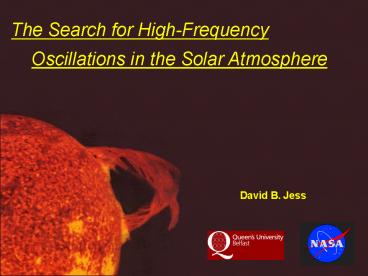The Search for HighFrequency - PowerPoint PPT Presentation
1 / 10
Title:
The Search for HighFrequency
Description:
The Search for High-Frequency. Oscillations in the Solar Atmosphere. David B. Jess ... Can high-frequency acoustic waves heat the chromosphere? ... – PowerPoint PPT presentation
Number of Views:47
Avg rating:3.0/5.0
Title: The Search for HighFrequency
1
The Search for High-Frequency
Oscillations in the Solar Atmosphere
David B. Jess
2
Introduction
- Can high-frequency acoustic waves heat the
chromosphere?
- Predicted abundance of 10-50 mHz acoustic waves
in subsurface of Sun
(Musielak 1994)
- Acoustic energy flux must balance radiative
losses
- Location of high-frequency acoustic waves
- Weakly magnetic regions (Ulmschneider 1990)
- Propagation of acoustic waves
- Density sensitive amplitude
- Shock formation
- Contradicting views (Fossum 2005 Fawzy 2002)
3
Fourier Analysis
- Ability to re-express a function in terms of
sinusoidal basis functions
- Sum of sinusoidal functions reconstruct
original timeseries
4
Fourier Problems
- Quasi-periodic signatures may be lost
5
Wavelet Analysis
- Ability to deconstruct timeseries into time and
frequency space simultaneously
6
Phase Difference Analysis
- Applicable in synchronised multi-camera setups
7
Phase Difference Analysis
- Phase determined by complex part of Cross
Wavelet Transform
- Coherence as a measure of linear dependence
- Linearity of Phase
- Non-linear fluctuations of Amplitude
- Linear fluctuations of Amplitude
Increasing Sensitivity
- Useful tool for evaluating wave properties
d Distance ? Frequency of Oscillation ?F
Phase difference
Phase Speed (Vph) 2 p d ? / ?F
8
Phase Difference Analysis
9
Future Work
- Fossum Carlsson (2005) state, High-frequency
waves cannot be the
dominant heating mechanism of the solar
chromosphere.
Limitations Cadence (4.5 s)
Bandpass (160 nm)
- DeForest (2004) states, High-frequency waves
might be significant
in the transition region.
- Calls for the need of high-cadence observations
in the lower solar atmosphere
RDI 2 camera system 20 fps
ROSA 6 camera system 20 fps
10
To the best of our knowledge, our Sun is the
only star
proven to grow vegetables.
Philip Scherrer (1973)































